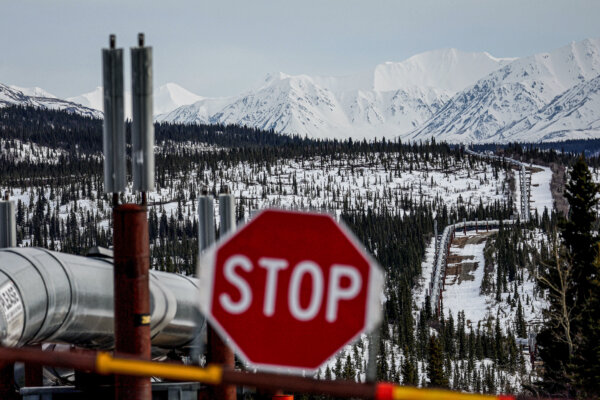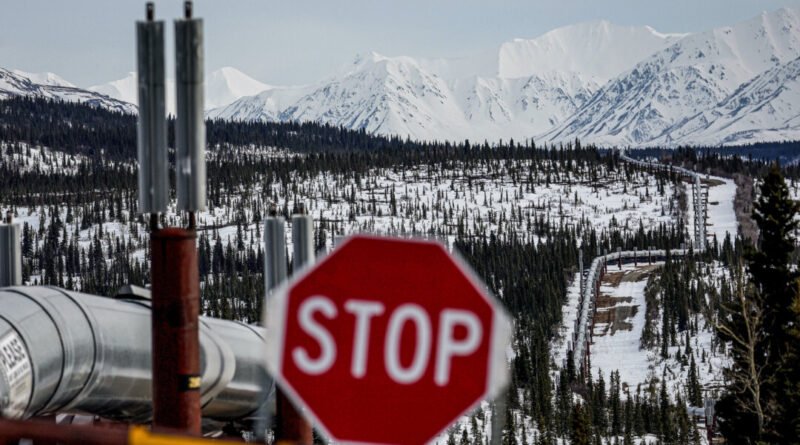Oil Restrictions in Alaska by Biden Administration Causing Harmful Effects, Experts Say

The President of the Voice of the Arctic Iñupiat stated that the administration claims to be ‘the most Indigenous friendly’ but does not live up to its own rhetoric.
Environmental and climate change advocates are celebrating the Biden administration’s drilling moratorium on nearly half of the National Petroleum Reserve in Alaska, but experts warn of the negative impacts.
The U.S. Department of the Interior announced on April 19 that the Bureau of Land Management (BLM) had finalized a rule banning oil and gas drilling on over 13 million acres in the Western Arctic.
The BLM also released its Final Supplemental Environmental Impact Statement, rejecting the re-approval of the Ambler Road project, proposed by the Alaska Industrial Development and Export Authority (AIDEA) in September 2022.
While these actions have been praised by environmental advocates, critics argue that they overlook the detrimental effects on the economy and national security.
Evergreen Action Senior Policy Lead for Energy Transition Mattea Mrkusic described it as a necessary step to strengthen protections for 13 million acres of Special Areas. He looks forward to working with the Biden administration to end oil and gas drilling on public lands.
In a similar vein, Earthjustice attorney Jeremy Lieb praised the move, calling for bolder action to keep the fossil fuel industry out of the Arctic for the sake of the climate and future generations.
Critics of the decisions argue that they will harm the economy and jeopardize America’s national security by reducing energy independence without viable alternatives available.
Diana Furchtgott-Roth, a policy expert at The Heritage Foundation, told The Epoch Times in an interview that the drilling ban sends a signal that the production of oil, natural gas, and critical minerals is not encouraged by the Biden administration.
She emphasized the importance of developing a domestic supply of critical minerals and avoiding dependency on China for these resources.
‘Misguided’
Alaska’s economy heavily relies on oil production, with most available jobs in oil production and mining industries.
Alaska is a leading source of various minerals essential for renewable energy technology and electric vehicle batteries.
The denial of the Ambler Road project approval limits future mining opportunities in the region due to the lack of infrastructure for mining companies.
Ambler Metals Managing Director Kaleb Froehlich expressed disappointment in the Biden administration’s decision to block the Ambler Road project.
Alaska’s unemployment rate is already high at 4.8 percent, with concerns about job losses and economic impact due to the new restrictions.
Mr. Froehlich predicted that the rules will harm Alaska’s Native communities by depriving them of jobs, tax revenues, and economic investments.
He also warned that the restrictions will hinder the development of a domestic supply of critical minerals essential for clean energy technology and national security.
Some indigenous community leaders have criticized the Biden administration’s drilling curbs in Alaska.
Voice of the Arctic Iñupiat President Nagruk Harcharek accused the administration of disregarding the needs of indigenous people and imposing policies against the community’s wishes.
He stated that the move will bring harm by reversing progress, impoverishing the community, and endangering their culture, pointing out a concerning trend in the administration’s actions.
On the other hand, Alaska Wilderness League Executive Director Kristen Miller supported the decisions by stating that the drilling moratorium will protect ecologically significant areas in America’s Arctic and contribute to fighting the biodiversity crisis.
‘This is No Gift’
Ms. Furchtgott-Roth, director of the Center for Energy, Climate, and Environment at The Heritage Foundation, criticized the Alaska drilling ban imposed by the Biden administration.
She highlighted the negative impacts of discouraging investment in oil and gas infrastructure and increasing dependence on foreign countries for critical minerals.
She pointed out that the drilling ban could raise gas prices for American drivers and affect future production expectations.
The current national average gas price is $3.68, remaining unchanged from a year ago.
Ms. Furchtgott-Roth raised concerns about the conflict between the new rules limiting access to critical minerals and the administration’s goal to increase electric vehicle adoption.
The drilling restrictions could hinder the administration’s plans to expand public electric charging stations and rely on natural gas as a primary source.
She also suggested that the timing of the announcement was politically motivated, aimed at garnering public support.
President Joe Biden cited climate change and nature conservation as reasons for protecting Alaska’s Arctic lands in a statement.
He emphasized the need for urgent action to address the climate crisis, protect the environment, and fulfill responsibilities to future generations.



